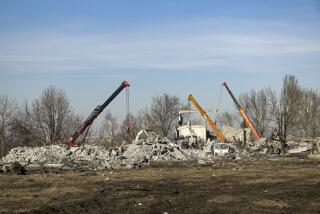Russia Soldier Runs Amok, Kills 7 at Remote Base
- Share via
MOSCOW — A soldier high on acetone fumes went on a rampage and killed seven fellow servicemen at a remote base on the Pacific island of Sakhalin, military officials reported Tuesday in describing the latest of at least 10 multiple slayings in the disintegrating army over the past two years.
The carnage Monday night spotlighted the deepening crisis afflicting Russia’s armed forces, which are grossly underfunded, poorly supervised and embittered over their deployment to political and ethnic conflicts such as the failed war for control of Chechnya.
Russia is in the midst of a chaotic reduction in the size of its services dictated by a seven-year economic slump and the world that has emerged since the Cold War ended with dissolution of the Soviet Union.
But as the once-vaunted Red Army fighting forces seek to define a new role for themselves amid dwindling resources and mission drift, draft dodging, desertion, hazing, suicide and murder have grown to epidemic proportions.
In the most recent and one of the more savage outbreaks of violence in the military, Pvt. Oleg Naumov, 20, attacked a fellow soldier with an ax, then grabbed an automatic rifle and shot his commander and a private at a guard post, four soldiers in the base canteen and four more in a restroom, army officials said. Seven of those attacked died of their wounds.
Naumov, who fled the base in the town of Pobedino but was apprehended early Tuesday, had been abusing drugs since age 13 and had a criminal record--unbeknownst to his commanders, according to Gen. Mikhail Klishin, deputy chief of the general staff, who spoke to reporters here after the slayings.
He said Naumov had confessed to inhaling acetone vapors while on duty Monday and claimed to have no recollection of the killings.
The Sakhalin Island slaughter was the second rampage by a gun-toting soldier in less than 24 hours. Earlier Monday, a soldier stationed on the outskirts of Moscow shot and killed a fellow serviceman, then deserted. He was later arrested.
“The army is sick. It has reached the limit of human endurance,” Gen. Nikolai S. Stolyarov, an air force officer and parliamentary deputy, lamented in an interview with the NTV network’s “Hero of the Day” program, discussing the latest violence. “The main cause is that the country lacks moral doctrine. We have forgotten such notions as honor, conscience, dignity and duty.”
Before his dismissal by Russian President Boris N. Yeltsin last spring, former Defense Minister Igor N. Rodionov warned of a “catastrophic situation” in the armed forces and insisted on more federal funding to carry out military reforms that are to reduce the number of Russian service personnel from 1.7 million to 1.2 million by the end of this year.
Yeltsin named former strategic rocket forces commander Gen. Igor D. Sergeyev to be defense minister in May.
Sergeyev has been more circumspect in his criticism of the state of the military, but he too has warned that the government will be unable to reduce the forces without thorough and costly internal reforms.
A report by the military prosecutor’s office late last year described suicide and violence as chronic problems in the armed forces.
In 1996, the latest year for which the military has provided statistics, 1,071 soldiers were murdered and 543 killed themselves. The report estimated that the number of suicides neared 1,000 last year, when food and fuel shortages added physical discomforts to the long-standing problems of delayed pay and brutal hazings.
Early editions of today’s newspaper Izvestia carried a grim graphic at the top of its front page titled “A Chronicle of the Losses in Times of Peace.” It listed the dates and details of 10 mass killings committed by soldiers since February 1996.
In an interview with the Echo of Moscow radio station, Mikhail Surkov, deputy chief of the lower house of parliament’s Defense Committee, blamed the Sakhalin rampage and other outbreaks of violence on “crude violations of regulations” by the government authorities responsible for overseeing the army.
Surkov also said that only about 20% of those called up for compulsory military service from Moscow each year actually enlisted--an indication that those with money or connections are able to bribe their sons’ way out of military service.
Even in this relatively affluent capital, soldiers deployed on public works projects surreptitiously beg small change and cigarettes from passersby.
More to Read
Sign up for Essential California
The most important California stories and recommendations in your inbox every morning.
You may occasionally receive promotional content from the Los Angeles Times.











